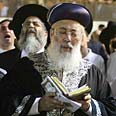
Rabbi Shlomo Amar
צילום: גיל יוחנן
They reign supreme
People come to see them from all over the world. Hundreds of thousands of admirers await their every word. Their assets are estimated at millions of dollars. They are most important, influential Israeli rabbinical courts










